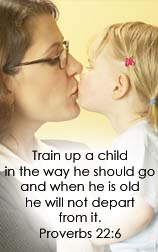Discipline Tips for Parents
Set a good example. You are role models for your children. Behaviors are usually “caught”, not “taught.” I can’t tell you how many parents I have had in my office complaining about their children using foul language by stating “I don’t know where in the *#%! they pick up those words!”
Don’t set too many rules. Before setting the rules ask yourself, is it necessary? Is it for their protection? Does it protect others? Too many rules are impossible to enforce and set the child up for failure.
Let your children participate in deciding on consequences if they break the rules. Kids will usually be harder on themselves than you are!
Write your rules down. I usually tell parents to divide a poster board vertically down the middle. On one side write the rules and on the other the consequences. Put the poster on the refrigerator. Then, if a child breaks a rule, walk them up to the board and say, “Wow…I feel bad for you that you have to suffer that consequence.”
Be consistent. Children will push the limits to see if you will really discipline them for breaking a rule. If you are consistent they will get the message that you mean business! They also want to know that you love them enough to set boundaries and say no.
Take the emotion out of your discipline. Set the rules and impose the consequences without expressing anger. When you get pulled over for speeding (which I’m sure none of you do!) the policeman doesn’t come up to your window and start yelling. He doesn’t say, “What is wrong with you?! Didn’t you see that speed limit sign?! Why didn’t you get up early enough to get to work without speeding?!” No…he let’s the consequence speak for itself. I don’t drive the speed limit because I think it’s a great law. I drive it (most of the time) because I don’t want to pay the fine. Consequences speak to me in ways that rules and laws don’t.
Don’t rescue your children from the consequence of their behavior. Some behaviors have their own natural consequences. If a child forgets to take their lunch to school…they go hungry. Going hungry will be a good reminder to take their lunch the next day (and no child ever starved from missing one meal). By rescuing them we teach them that they don’t have to be responsible.
Be specific. If you want your children to stop a particular behavior tell them:
- What to stop
- Why to stop it
- What to do instead
Praise your children for good behavior. Let your children know that you appreciate their efforts. The rule of discipline is that anything you give attention to increases (good behavior and bad!)


























2 comments:
Our pediatrician suggested at our last visit that we have three categories of rules. First, safety for the child. Second, safety for others. Third, things that bug Andy and I consistently enough that we feel the need for a rule. That's a good guideline, I thought, for creating and enforcing rules.
Good addition! Some things may not be a problem for me, but they may drive you crazy...so it's a good idea to create rules about things that bug you consistently.
Post a Comment